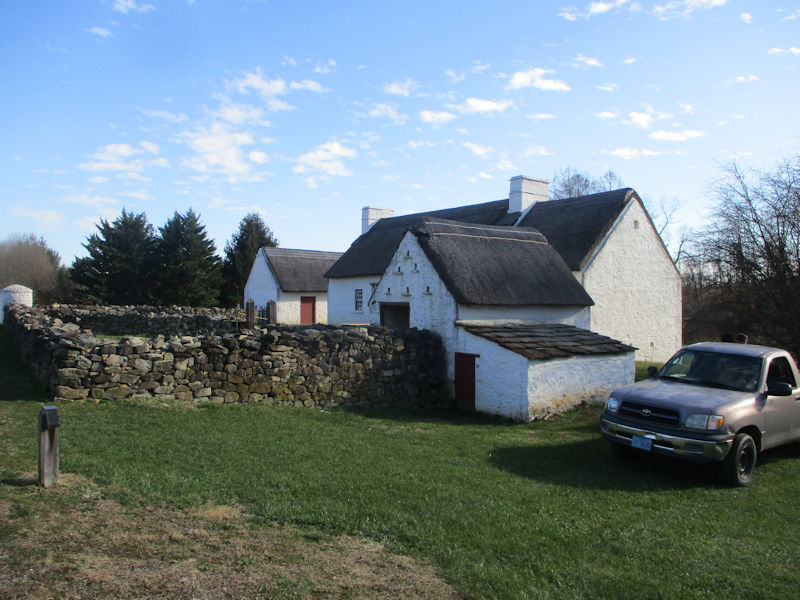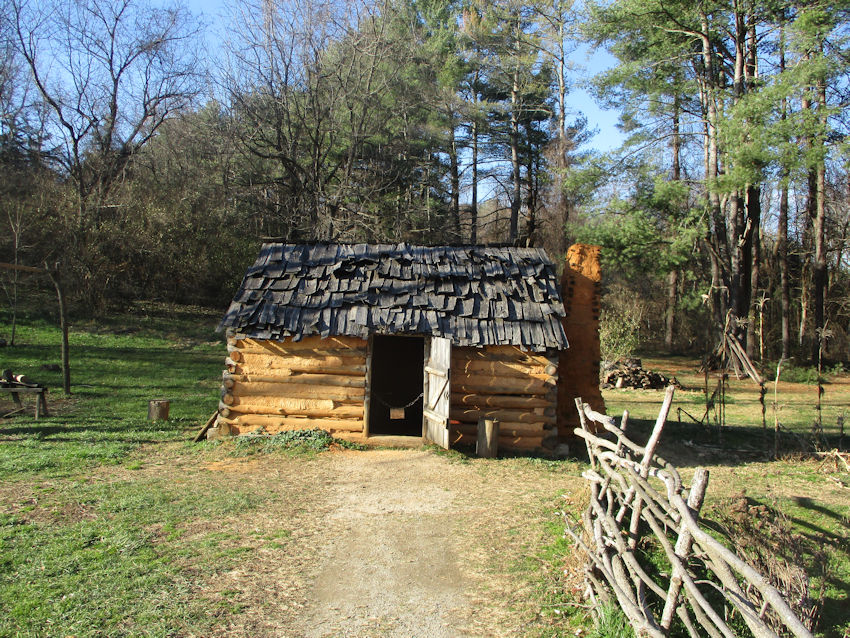You may not find this terribly rewarding unless you're included here, so this is a good time for casual and random browsers to turn back before they get too caught up in the sweep and majesty of the proceedings and can't let go.
We've visited the Frontier Culture Museum in Staunton, Virginia, several times since moving here in 2019. It's an interesting and instructive institution commemorating the living styles and conditions of the European immigrants who settled in the Shenandoah Valley in the 18th century -- specifically, the English, Irish, and Germans -- as well as a look at the Native American settlements that were here at the time and at the West African homes of the slaves that were kidnapped and brought over under duress to help Build America.
In preparing webpages of those earlier visits, we endeavored to carry over some of the explanatory information from the interpretive signs omnipresent all over the site, as well as summaries of some of what we were told by the docents illustrating the crafts and backgrounds we were seeing before us. And there is always the informative Museum website to find further details.
But there's no use in repeating all of that stuff here, so this page is devoted entirely to nice pictures of the exhibits obtained on a recent walk-through, in December 2020 (to take our minds off our president's slow-motion coup d'état)(and his covid plague), and one can retrieve those explanatory photo captions from visits of 3 May 2019, 14 October 2019, 29 October 2019, and 29 December 2019. But it goes without saying that there is no substitute for a personal visit to the venue.

We enter, bursting with anticipation -- a fine day it is, too (though this photo is from an earlier visit).

The layout -- the entrance is at the bluish dot right of centre.

This is a 17th century yeoman's farm in the West Midlands of England (literally: it's been brought over here in pieces).




'Enter' and 'Exit' on the doors to keep the social-distancing visitors flowing along smoothly.

Kitchen and diningroom

Workroom

And master bedroom (there are kids' rooms upstairs, but off-limits)


The English house from across the creek . . .

. . . on the way to the Irish forge.

Perambulating the tiny wetland


The 18th century Irish forge is an original as well, brought from county Fermanagh in Ulster.

During season, there's a blacksmith in there (in appalling heat) making all of the original metalwork in the Museum (for its use and for sale), and explaining his craft.

Passing by the amphitheatre


The English house again . . .

. . . and an 18th century Irish farmhouse, from the Protestant county of Tyrone in Ulster Province.



A feline occupant

A working loom in the next room


Onward to the German farm

The 18th century farmhouse and outbuildings have been brought from the Protestant Palatinate of the Rhine in southwestern Germany.


Say hello to Sunshine. There are three massive specimens on the property, all with evocative names.


The workroom

The dining- and livingroom

The cosy little kitchen . . .

. . . with its energy-saving stove, a German invention evidently

This a representation of a Shenandoah region 'Eastern woodland' Native American village, here called Ganatastwi, 'small town' in the Onondaga dialect of the Iroquoian language.

A very small town, but it's just meant to be representative


Approaching a 1740s settler's cabin in the 'Great Appalachian Valley', which includes the Shenandoah in western Virginia


Rudimentary. A 'starter home'.


Yes, 'rudimentary' is the word.


A little farther along, the descendants of that 1740s cabin might have graduated to an 1820s homestead like this one.

This gentle porcine monster is called Dalley.

[we take a quick step back]

We're visiting the 1820s farmhouse -- that's the 1850s farmhouse across the way.

Kids having fun . . . but we wouldn't try that.

The 1820s farm, with the nearly contemporary schoolhouse in the background


A minimalist decor



Back to school

The 1850s farmhouse, with a spring house in the foreground and a shed for drying meat (or something like that), and another in the far right background for drying tobacco maybe

A newly restored barn, occupied by another porcine monster, this one called 'Trouble'





In season, there are knowledgeable docents here to explain everything for you (and even take questions).

Round the back (wheelchair accessible)

A look back towards the schoolhouse, with the Betsy Bell and Mary Gray 'Wilderness Parks' (each a 10-minutes' walk up from the carpark).
 Dwight Peck's personal website
Dwight Peck's personal website






























































